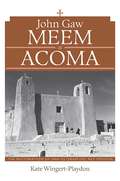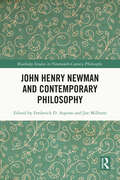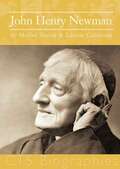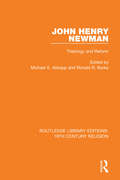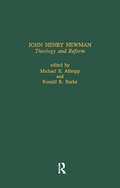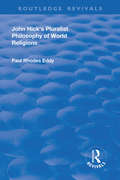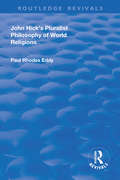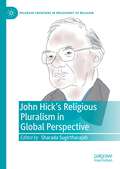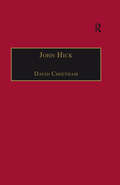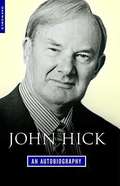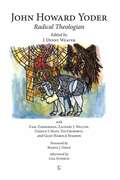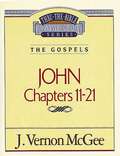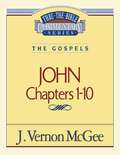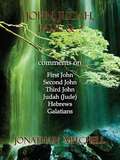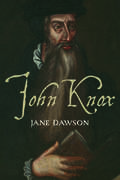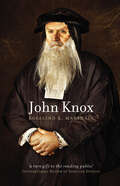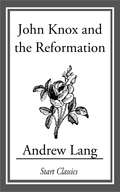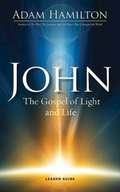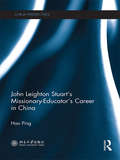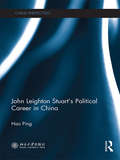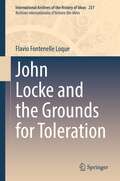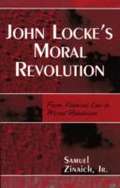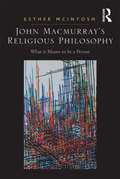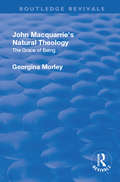- Table View
- List View
John Gaw Meem at Acoma: The Restoration of San Esteban del Rey Mission
by Kate Wingert-PlaydonBuilt by Spanish Franciscan missionaries in the seventeenth century, the magnificent mission church at Acoma Pueblo in west-central New Mexico is the oldest and largest intact adobe structure in North America. But in the 1920s, in danger of becoming a ruin, the building was restored in a cooperative effort among Acoma Pueblo, which owned the structure, and other interested parties. Kate Wingert-Playdon&’s narrative of the restoration and the process behind it is the only detailed account of this milestone example of historic preservation, in which New Mexico&’s most famous architect, John Gaw Meem, played a major role.
John Henry Newman and Contemporary Philosophy (Routledge Studies in Nineteenth-Century Philosophy)
by Frederick D. Aquino Joe MilburnWhile John Henry Newman’s writings have long received the attention of historians, theologians, and literary critics, they have largely been neglected by philosophers. However, Newman’s importance as a philosopher is just now beginning to be acknowledged.This volume brings together leading philosophers and Newman scholars to explore the contours of his philosophical thought and to show its relevance to contemporary philosophy. The chapters explore, develop, and evaluate Newman’s thought, considering recent work in epistemology, philosophy of religion, moral philosophy, and philosophy of education.John Henry Newman and Contemporary Philosophy will be of interest to scholars and advanced students interested in nineteenth-century philosophy, philosophy of religion, epistemology, moral philosophy, philosophy of education, and nineteenth-century religious thought.
John Henry Newman: Apostle To The Doubtful (Cts Biographies Ser.)
by Meriol Trevor Leonie CaldecottEminent Victorian academic and thinker, Anglican clergyman and celebrated convert, caring pastor and writer, Catholic priest, and Cardinal - these are some of the signposts along John Henry Newmans celebrated journey. This biography reveals a compassionate man who was much more than a writer and polemicist. As a pastor, priest, and friend, he offered lasting counsel to many and lived out the demands of the gospel.
John Henry Newman: Theology and Reform (Routledge Library Editions: 19th Century Religion #2)
by Michael E. Allsopp Ronald R. BurkeThis collection of papers, first published in 1992, grew out of a concern for the perduring nature of the thought of John Henry Cardinal Newman. Although Cardinal Newman died over one hundred years ago, his influence on today’s thinking is still strong. Newman put forward an ideal of society and life which has a recognizable relation to the lasting possibilities open to humankind. The editors and contributors of this volume have been brought together by a common interest in a man for whom the continual search for truth is paramount.
John Henry Newman: Theology and Reform (Routledge Library Editions: 19th Century Religion Ser. #2)
by Michael E. Allsopp Ronald R. BurkeThis collection of papers grew out of a concern of several at Creighton University for the perduring nature of the thought of John Henry Cardinal Newman. Although Cardinal Newman died some one hundred years ago, his influence on today’s thinking is still strong. Like Sir Thomas More with his Utopia, Newman put forward an ideal of society and life which has a recognizable relation to the lasting possibilities open to humankind. First published in 1992. Routledge is an imprint of Taylor & Francis, an informa company.
John Hick's Pluralist Philosophy of World Religions
by Paul Rhodes EddyThis title was first published in 2002. One of the most fascinating and controversial interpretations of religious diversity is 'religious pluralism.' According to John Hick's model of religious pluralism, all the world's great religions are equally valid ways of understanding and responding to the ultimate spiritual reality. This book offers an exposition of, and critical response to, John Hick's model. Introducing the various interpretations of religious diversity being discussed today, this book presents constructive suggestions as to how things could be further developed to offer a more accurate, less confusing presentation of the various options in theology of religions. The standard threefold typology of responses to religious diversity - exclusivism, inclusivism, and pluralism - are explained and defended. Hick's pluralist interpretation of religious diversity is traced, culminating in a critical assessment of Hick's pluralistic model and an up-to-date summary of a variety of critiques directed toward Hick's proposal.
John Hick's Pluralist Philosophy of World Religions
by Paul Rhodes EddyThis title was first published in 2002. One of the most fascinating and controversial interpretations of religious diversity is 'religious pluralism.' According to John Hick's model of religious pluralism, all the world's great religions are equally valid ways of understanding and responding to the ultimate spiritual reality. This book offers an exposition of, and critical response to, John Hick's model. Introducing the various interpretations of religious diversity being discussed today, this book presents constructive suggestions as to how things could be further developed to offer a more accurate, less confusing presentation of the various options in theology of religions. The standard threefold typology of responses to religious diversity - exclusivism, inclusivism, and pluralism - are explained and defended. Hick's pluralist interpretation of religious diversity is traced, culminating in a critical assessment of Hick's pluralistic model and an up-to-date summary of a variety of critiques directed toward Hick's proposal. Paul Rhodes Eddy concludes that Hick's present model is ultimately unsuccessful in retaining both of his long-cherished goals, a robust religious realism and a consistent religious pluralism, whilst overcoming the most difficult problem for the pluralist, the fact that the world's religions understand the divine in often contradictory ways.
John Hick's Religious Pluralism in Global Perspective (Palgrave Frontiers in Philosophy of Religion)
by Sharada SugirtharajahThis volume contains fresh scholarly contributions to mark the birth centenary of John Hick, the internationally well-known philosopher of religion, whose works continue to have significant global relevance in today’s religiously diverse and conflict-ridden world. His writings have reset the parameters of religious pluralism. Up till now, Hick’s religious pluralism has been mainly seen in relation to the Western context where Christianity is the predominant religion. This volume includes both Western and non-Western engagement with his thinking in contexts such as Japan, China, Korea, Nigeria, and India, where Christianity is a minority religion with little political power. Its distinctiveness lies in widening the debate on religious pluralism by bringing Hick’s pluralistic hypothesis into a constructive cross-cultural and interreligious conversation with scholars of Hinduism, Jainism, Daoism, Judaism, Christianity, Islam and African traditional religions. In doing so, this collection examines how Hick’s philosophy of religious pluralism has been received, appropriated and appraised by these scholars. It has been appreciated and critiqued in equal measure, and continues to impact on current thinking on religious pluralism. This volume makes a significant contribution to the debate initiated by Hick.
John Hick: A Critical Introduction and Reflection
by David CheethamJohn Hick is considered to be one of the greatest living philosophers of religion. Hick's philosophical journey has culminated in the grand proposal that we should see all the major world religions as equally valid responses to the same ultimate reality (the 'Real'). This book presents a critical introduction to John Hick's speculative theology and philosophy. The book begins where Hick began, with the problems of religious language, and ends where Hick is now, exploring the questions of religious plurality. Incorporating early aspects that Hick himself would now wish to qualify, as well as explanations that reflect Hick's present focus, Cheetham offers some speculative reflections of his own on key topics, highlighting Hick's influence on contemporary theology and philosophy of religion. All those studying the work of this great philosopher and theologian will find this new introduction offers an invaluable overview along with fresh critical insight.
John Hick: An Autobiography
by John HickFrom his early conversion to evangelical Christianity to his role as a conscientious objector in World War II and his move towards religious pluralism, this book will be core reading for many courses taught on John Hick around the country.
John Howard Yoder: Radical Theologian
by J Denny Weaver'John Howard Yoder: Radical Theologian' shows that for John Howard Yoder both theology (in particular Christology) and ethics are expressions of the meaning of the narrative of Jesus. All such statements are relative to a particular context, so thattheology and ethics are subject to reaching back to the narrative in order to restate the meaning in new and ever-changing contexts. This methodology is visible in Yoder's 'Preface to Theology', which has been little used in most treatments of Yoder's thought. Yoder has been characterised as standing on Nicene orthodoxy, criticised for rejecting Nicene orthodoxy, called heterodox, and designated a postmodern thinker to be interpreted in terms of other such thinkers. None of these characterisations adequately locates the basis of his methodology in the narrative of Jesus. Thus 'John Howard Yoder: Radical Theologian' aims to go beyond or to supersede existing treatments with its demonstration that Yoder is a radical theologian in the historical meaning of radical - that is, as one who returns to the root - but also relates his theology to the personal accusations that clouded his later years. For Christian faith, this root is Christ. Parts II and III of the book explore the sources of Yoder's approach, and its application in several contemporary contexts.
John I: John, Chapters 11-21 (Thru the Bible)
by Vernon McgeeRadio messages from J. Vernon McGee delighted and enthralled listeners for years with simple, straightforward language and clear understanding of the Scripture. Now enjoy his personable, yet scholarly, style in a 60-volume set of commentaries that takes you from Genesis to Revelation with new understanding and insight. Each volume includes introductory sections, detailed outlines and a thorough, paragraph-by-paragraph discussion of the text. A great choice for pastors - and even better choice for the average Bible reader and student! Very affordable in a size that can go anywhere, it's available as a complete 60-volume series, in Old Testament or New Testament sets, or individually.
John I: The Gospels (Thru the Bible #38)
by J. Vernon McgeeRadio messages from J. Vernon McGee delighted and enthralled listeners for years with simple, straightforward language and clear understanding of the Scripture. Now enjoy his personable, yet scholarly, style in a 60-volume set of commentaries that takes you from Genesis to Revelation with new understanding and insight. Each volume includes introductory sections, detailed outlines and a thorough, paragraph-by-paragraph discussion of the text. A great choice for pastors - and even better choice for the average Bible reader and student! Very affordable in a size that can go anywhere, it's available as a complete 60-volume series, in Old Testament or New Testament sets, or individually.
John Judah Paul & ?
by Jonathan MitchellA VALUABLE COMPANION to your study and understanding a! the Scriptures, this collection unlocks every word, every verse and every paragraph to uncover the original thought and intent of God '5 Word. The interpretation and comments on the letters of J0hn Judah Paul and the letter to the Hebrews are based upon the New Testament translation by the author and roe-examines the essential messages of the New Covenant, the preeminence of Christ, the truth of love, the better promises. the freedom from bondage, and the God-gifted power of grace over law Drawing upon years of meticulous research of multiple texts and resources this work IS intended to shed new light based upon a correct understanding of the Greek texts Within the perspective of the local life situations and their first century contexts, and equally important, to serve as a catalyst for critical thinking regarding the impact of these letters upon our lives today. Inside you will find: * A word-based translation * Multiple renderings of the Greek texts * A historical-critical approach * Critical attention to the significance of the Greek verb tenses * Significance of optional case functions of nouns * A concise introduction to each letter * Alternate renderings parenthetically inserted in lightface * Multiple references to other New Testament letters and the tow gospels * Additional quotes cited from various commentators * Verses presented in bold face for easy reading For readers worldwide - pastors teachers students and study groups this extensive verse-by-verse commentary expresses the transformative power of the continuously active and luring word. About the Author JONATHAN MITCHELL IS a speaker teacher and translator of the Greek New Testament He is the author of THE NEW TESTAMENT, God's Message of Goodness Ease and Well-being Which Brings God's Grits of His Spin! His Life, His Grace, His Power. His Fairness. His Peace and His Love; and Peter, Paul and Jacob Comments on First Peter, Philippians, Colossians, First Thessalonians Second Thessalonians, First Timothy, Second Timothy, Titus, Jacob (James). He holds a master's degree in Anthropology from Northern Arizona University and resides With his family in Arizona.
John Knox
by Jane DawsonJane Dawson has written the definitive life of John Knox, a leader of the Protestant Reformation in sixteenth-century Scotland. Based in large part on previously unavailable sources, including the recently discovered papers of Knox's close friend and colleague Christopher Goodman, Dawson's biography challenges the traditionally held stereotype of this founder of the Presbyterian denomination as a strident and misogynist religious reformer whose influence rarely extended beyond Scotland. She maintains instead that John Knox relied heavily on the support of his "godly sisters" and conferred as well as argued with Mary, Queen of Scots. He was a proud member of the European community of Reformed Churches and deeply involved in the religious Reformations within England, Ireland, France, Switzerland, and the Holy Roman Empire. Casting a surprising new light on the public and private personas of a highly complex, difficult, and hugely compelling individual, Dawson's fascinating study offers a vivid, fully rounded portrait of this renowned Scottish preacher and prophet who had a seismic impact on religion and society.
John Knox
by Rosalind K. MarshallA bestselling biography of one of the Reformations&’ central characters from the author of Mary Queen of Scots: Truth or Lies. Following John Knox&’s career in Scotland, England, France, Switzerland, and Germany, Rosalind K. Marshall explains in straightforward terms the issues and beliefs which concerned the theologian so deeply. She also focuses on his relationship with the opposite sex, discussing the notorious First Blast of the Trumpet against the Monstrous Regiment of Women, his dealings with Mary, Queen of Scots, and the patient, revealing letters he wrote his mother-in-law. This book untangles truth from mythology in the life of this strange, complex, and determined man and constructs a balanced picture of sixteenth-century Scotland that places Knox clearly within the context of change and reformation which was sweeping the whole of Europe. The result is a richer and more complex portrayal of both Scotland and Knox than any hitherto available, and the first modern paperback of one of the most famous of all Scottish figures. Praise for John Knox and the books of Rosalind K. Marshall &“A rare gift to the reading public.&” —International Review of Scottish Studies &“An admirable new biography . . . a remarkable study, illuminating both a character and an age.&” —Antonia Fraser, award-winning author of Cromwell, on Mary of Guise &“Dr Marshall . . . uses exactly the right mixture of flowing, readable narrative . . . to breathe life into the historical dust.&” —Jack Firth on Bonnie Prince Charlie
John Knox and the Reformation
by Andrew LangAndrew Lang (1844-1912) was a prolific Scots man of letters, a poet, novelist, literary critic and contributor to anthropology. He now is best known as the collector of folk and fairy tales. He was educated at the Edinburgh Academy, St Andrews University and at Balliol College, Oxford. As a journalist, poet, critic and historian, he soon made a reputation as one of the ablest and most versatile writers of the day. Lang was one of the founders of the study of "Psychical Research," and his other writings on anthropology include The Book of Dreams and Ghosts (1897), Magic and Religion (1901) and The Secret of the Totem (1905). He was a Homeric scholar of conservative views. Other works include Homer and the Epic (1893); a prose translation of The Homeric Hymns (1899), with literary and mythological essays in which he draws parallels between Greek myths and other mythologies; and Homer and his Age (1906). He also wrote Ballades in Blue China (1880) and Rhymes la Mode (1884).
John Knox for Armchair Theologians
by Suzanne McdonaldThis volume in the popular Armchair series presents a short and reader-friendly introduction to the tumultuous life and theology of the fiery reformer John Knox. As leader of the Scottish Reformation, Knox notably came into conflict with the Roman Catholic Church, particularly Queen Mary. He was also an outspoken advocate for education and care for the poor, and is widely regarded as the founder of the Church of Scotland. Each chapter includes a description of Knox's activities as well as a discussion of key texts that introduce Knox's theological convictions. Expertly written by Suzanne McDonald, and featuring witty illustrations from Ron Hill, this book offers an intriguing introduction to the life and work of this major theological figure.
John Leader Guide: The Gospel of Light and Life (John series)
by Adam HamiltonThe Gospel of John is the most deeply spiritual of the four gospels. It includes some of the loftiest and most loved verses in all the Bible: "And the Word became flesh…," "For God so loved the world…," "You who are without sin cast the first stone…," "I am the resurrection and the life…," "I am the way, and the truth, and the life." The writing is filled with rich images and profound truths, but John notes that his aim in writing the gospel is that his readers will not only believe in Jesus Christ, but that they "may have life in his name."Join Adam Hamilton and experience a season of spiritual growth and life-changing renewal while exploring the major themes of John while reading the entire Gospel of John.The Leader Guide contains everything needed to guide a group through the bible study program including session plans and discussion questions, as well as multiple format options. This guide centers around the book, the videos, and Scripture.
John Leighton Stuart's Missionary-Educator's Career in China (China Perspectives)
by Hao PingIn China, John Leighton Stuart (1876-1962) is a controversial figure occupying an important position in the history of modern China and Sino-U.S. relations. As a scholar and educator, Stuart loved Chinese culture and contributed much to the development of Chinese education. While as a missionary, he was inherently prejudiced against Marxism. As the U.S. ambassador to China, Stuart executed U.S. government's policy, and was finally stereotyped as a symbol of "American imperialism". This book is a comprehensive and systematic study of Stuart's missionary-educator's career in China. It gives a detailed account of Stuart's missionary activities and contribution to the establishment and development of Yenching University as the founding president in China. Yenching, founded in 1919, left a significant and lasting legacy to Chinese education. It also contributed much to western studies on Asian culture with the Harvard-Yenching Institute established in 1928. By collecting substantial relevant materials both at home and abroad, both published and unpublished, this book reveals the multidimensional and complex features of Stuart, getting rid of the stereotype. Academic and general readers interested in Stuart, missionary education in modern China and modern Chinese history will be attracted by this book.
John Leighton Stuart’s Political Career in China (China Perspectives)
by Hao PingIn China, John Leighton Stuart (1876-1962) is a controversial figure occupying an important position in the history of modern China and Sino-U.S. relations. As a scholar and educator, Stuart loved Chinese culture and contributed much to the development of Chinese education. While as a missionary, he was inherently prejudiced against Marxism. As the U.S. ambassador to China, Stuart executed U.S. government's policy, and was finally stereotyped as a symbol of "American imperialism". This book gives a detailed account of Stuart's complicated and deep political involvement in modern China. Stuart had close relationships with Chiang Kai-shek and other high-ranking officials of Kuomingtang (KMT), while he was also an honored guest of Mao Tse-tung and Chinese Communist Party (CCP). During his tenure as the U.S. Ambassador to China, Stuart did implement U.S. government's policy of supporting KMT. But when the CCP's gaining power became inevitable, he took a pragmatic attitude and urged the U.S. government to normalize its diplomatic relations with the Communist Government. These seemingly contradictory behaviors reveal Stuart's complex features and the changeable era. By collecting substantial relevant materials both at home and abroad, both published and unpublished, this book reveals Stuart's multidimensional characters, getting rid of the stereotype. Academic and general readers interested in Stuart, modern Chinese history and Sino-U.S. relations will be attracted by this book.
John Locke and the Grounds for Toleration (International Archives of the History of Ideas Archives internationales d'histoire des idées #237)
by Flavio Fontenelle LoqueThis book offers a detailed analysis of John Locke’s case for toleration and proposes an interpretation that shows the links between his political reasoning and his reflection on the ethics of belief. Locke is concerned with toleration not only when he discusses the ends of the Commonwealth, but also when he assesses the duties of private persons regarding the search for truth. The purpose of this book is to shed light on both of these branches, which have not been sufficiently explored in other studies on Locke. With particular attention to the notions of charity, obstinacy, fallibility, reciprocity and distinction between belief and knowledge, the author proposes a reading of the Epistola de Tolerantia, an extensive discussion of the controversy between Locke and Jonas Proast, as well as an examination of An Essay Concerning Human Understanding, in order to establish the meaning and interconnection of Locke’s arguments in favour of toleration.
John Locke's Moral Revolution: From Natural Law to Moral Relativism
by Samuel Zinaich JrJohn Locke's Moral Revolution critiques two traditional approaches to John Locke's philosophy. The first approach interprets John Locke as committed to justifying his early his early Christian / Aristotelian views of the law of nature. The second approach sees Locke attempting to manage a cluster of inconsistent moral views. In this new work, author Samuel Zinaich, Jr. argues that Locke attempts to establish a solid underpinning for religious, moral, and political ideas upon the philosophy of corpuscularism.
John Macmurray's Religious Philosophy: What it Means to be a Person
by Esther McIntoshRecent dissatisfaction with individualism and the problems of religious pluralism make this an opportune time to reassess the way in which we define ourselves and conduct our relationships with others. The philosophical writings of John Macmurray are a useful resource for performing this examination, and recent interest in Macmurray's work has been growing steadily. A full-scale critical examination of Macmurray's religious philosophy has not been published and this work fills this gap, sharing his insistence that we define ourselves through action and through person-to-person relationships, while critiquing his account of the ensuing political and religious issues. The key themes in this work are the concept of the person and the ethics of personal relations.
John Macquarrie’s Natural Theology: The Grace of Being (Routledge Revivals Ser.)
by Georgina MorleyTitle first published in 2003. John Macquarrie has been a major contributor in the theological world for more than forty years, but as yet very little secondary material on his work has appeared. This book offers an insightful introduction to Macquarrie's theology, arguing that at its heart is a systematic theology of gift. Tracing the development of his thought from its early existentialism to the social and world-affirming perspectives of later writings, this book shows how these developments emerge in dialogue with contemporary thinkers. Morley demonstrates how Macquarrie's theology mediates between two traditionally opposing theologies of gift and being, centring on the doctrines of God and of human being, and reaching its fullest expression in Christology, with Christ as the focal point of two personal movements of self-giving - divine and human. Macquarrie himself contributes a Foreword.
